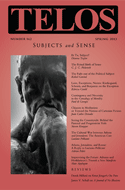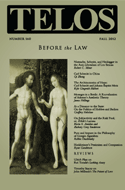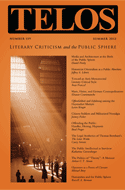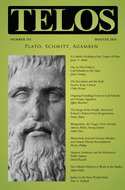By Russell A. Berman · Monday, March 18, 2013 Telos 162 (Spring 2013) is now available for purchase in our store.
 At its inception, Telos pursued a specific project as a journal: to serve as a bridge between the world of what was then often referred to as “European theory” and a U.S. intellectual world largely defined by quantitative methods in the social sciences. Over time, the terminology changed, and it is now more common to use the parlance of “analytic” and “continental” modes of philosophy, and if the latter term still clearly points toward Europe, there are representatives of both trends in the university lives on both sides of the Atlantic. In retrospect, however, the question for Telos was never one of a simple cultural transfer or the pursuit of some intellectual equilibrium in which scholars in both worlds would think the same way. On the contrary, instead of thinking about method in general, at stake for Telos was the difference between reflections on the meaning of the human condition, thoughtful explorations of the good life, and what appeared to be an exclusively numerical measuring of the status quo, a positivist description of what already exists, with no expectation of change. At its inception, Telos pursued a specific project as a journal: to serve as a bridge between the world of what was then often referred to as “European theory” and a U.S. intellectual world largely defined by quantitative methods in the social sciences. Over time, the terminology changed, and it is now more common to use the parlance of “analytic” and “continental” modes of philosophy, and if the latter term still clearly points toward Europe, there are representatives of both trends in the university lives on both sides of the Atlantic. In retrospect, however, the question for Telos was never one of a simple cultural transfer or the pursuit of some intellectual equilibrium in which scholars in both worlds would think the same way. On the contrary, instead of thinking about method in general, at stake for Telos was the difference between reflections on the meaning of the human condition, thoughtful explorations of the good life, and what appeared to be an exclusively numerical measuring of the status quo, a positivist description of what already exists, with no expectation of change.
Continue reading →
By Russell A. Berman · Monday, September 17, 2012 Telos 160 (Fall 2012) is now available for purchase here.
 The Supreme Court decision on the Patient Protection and Affordable Care Act, the Obama administration’s signature legislation on health care, attracted exceptional public attention, and rightly so. Health is a vital concern, and the topic is charged with acerbic party politics. More importantly, the terms of the debate give evidence of a widespread awareness, across the political spectrum, that the case has raised questions about the scope of government power and the permissible reach of legislation. If there is one point on which opponents have agreed, it is this recognition of the core importance of the outcome for defining the relationship of the state to society. Both proponents of cradle-to-grave government care and advocates of a strictly limited state power (whether in individualist, free-market, or communitarian modes) recognize that the health-care outcome could be a decisive moment in the evolution of American society. The Supreme Court decision on the Patient Protection and Affordable Care Act, the Obama administration’s signature legislation on health care, attracted exceptional public attention, and rightly so. Health is a vital concern, and the topic is charged with acerbic party politics. More importantly, the terms of the debate give evidence of a widespread awareness, across the political spectrum, that the case has raised questions about the scope of government power and the permissible reach of legislation. If there is one point on which opponents have agreed, it is this recognition of the core importance of the outcome for defining the relationship of the state to society. Both proponents of cradle-to-grave government care and advocates of a strictly limited state power (whether in individualist, free-market, or communitarian modes) recognize that the health-care outcome could be a decisive moment in the evolution of American society.
Continue reading →
By Russell A. Berman · Monday, June 18, 2012 Telos 159 (Summer 2012) is now available for purchase here.
 Edna St. Vincent Millay’s famous sonnet “If I should learn, in some quite casual way,” included in her 1917 volume Renascence and Other Poems, stages the harsh collision of private sentiment and public silence, against the backdrop of the mass culture of modernity. Seated in a crowded subway, the speaker glances at the back of a newspaper held by another commuter, only to learn of the death of a loved one, perhaps a lover, the unnamed addressee of the poem. The fact of the apathetic publication of the news underscores, through ironic contrast, the shock and the depth of private affect that cannot be expressed in the public of public transportation: “I should not cry aloud—I could not cry / Aloud, or wring my hands in such a place—” Edna St. Vincent Millay’s famous sonnet “If I should learn, in some quite casual way,” included in her 1917 volume Renascence and Other Poems, stages the harsh collision of private sentiment and public silence, against the backdrop of the mass culture of modernity. Seated in a crowded subway, the speaker glances at the back of a newspaper held by another commuter, only to learn of the death of a loved one, perhaps a lover, the unnamed addressee of the poem. The fact of the apathetic publication of the news underscores, through ironic contrast, the shock and the depth of private affect that cannot be expressed in the public of public transportation: “I should not cry aloud—I could not cry / Aloud, or wring my hands in such a place—”
Continue reading →
By Russell A. Berman · Monday, April 16, 2012 Time was when standard accounts of modernity and modernization involved the claim of pervasive secularization. Progress meant the disappearance of religion, clearing the way for the unchallenged reign of reason and science. Yet if anything has become clear in world politics in the past decade or two, it is the durability of religion and, especially, the mobilization of religion in political processes. At the same time, it has become apparent how complex and multiform the connection between religion and politics can become and how religion continues to pose new questions to the secularization thesis.
Continue reading →
By Russell A. Berman · Monday, January 9, 2012 Now posted at the Inside Higher Ed website, an excerpt from Russell A. Berman’s presidential address at the 2012 meeting of the Modern Language Association.
Not all doctorate recipients will become faculty members, but all future faculty will come out of graduate programs. Do these programs serve the needs of graduate students well?
In light of the rate of educational debt carried by humanities doctoral recipients, twice that of their peers in sciences or engineering; in light of the lengthy time to degree in the humanities, reaching more than nine years; and in light of the dearth of opportunities on the job market, the system needs to be changed significantly. I want to begin to sketch out an agenda for reform.
The major problem on all of our minds is the job market, the lack of sufficient tenure-track openings for recent doctorate recipients. One response I have heard is the call to reduce the flow of new applicants for jobs by limiting access to advanced study in the humanities. If we prevent some students from pursuing graduate study—so the argument goes—we will protect the job market for others. I disagree.
Read the full essay here.
Continue reading →
By Russell A. Berman · Monday, December 19, 2011 Telos 157 (Winter 2011) is now available for purchase here.
 The political disorder grows ever thicker. As of this writing, the European financial crisis seems as far away from resolution as ever, although the same complaint might have pertained three months ago nor is the diagnosis likely to lose its validity three months hence. The eurozone insists on tumbling toward an economic catastrophe that may drag the rest of the world down as well. Meanwhile prospects for a liberalizing democracy in the former Communist empire have largely vanished from living (or incarcerated) memory, and the trajectory of the Arab Spring poses more questions than answers. To be sure, things may still take a turn for the good, and the ignominious ends of some of the dictators merit celebration. Yet deserving candidates for violent overthrow and execution remain in power, in Damascus and Tehran, terrorizing their populations, amidst a larger civil war throughout the Middle East. Much of this disorder has profound local roots, stemming from competition among alternative religious traditions, political models, and economic agenda. But some of the instability results as well from the loss of ballast in the wake of the American retreat, itself a symptom of the chaos of American politics. The pre-primary period optimizes neither political virtue nor sober leadership, but even with that qualification, this lead-up to the 2012 electoral season stands out for its chilling hopelessness. It is hard to imagine a happy end to the story. The power of the state continues to expand, which undermines the integrity of individuals, but its capacity to influence the economy nonetheless diminishes. Disorder surrounds us, and the center gives way. Is there room for civic virtue? The political disorder grows ever thicker. As of this writing, the European financial crisis seems as far away from resolution as ever, although the same complaint might have pertained three months ago nor is the diagnosis likely to lose its validity three months hence. The eurozone insists on tumbling toward an economic catastrophe that may drag the rest of the world down as well. Meanwhile prospects for a liberalizing democracy in the former Communist empire have largely vanished from living (or incarcerated) memory, and the trajectory of the Arab Spring poses more questions than answers. To be sure, things may still take a turn for the good, and the ignominious ends of some of the dictators merit celebration. Yet deserving candidates for violent overthrow and execution remain in power, in Damascus and Tehran, terrorizing their populations, amidst a larger civil war throughout the Middle East. Much of this disorder has profound local roots, stemming from competition among alternative religious traditions, political models, and economic agenda. But some of the instability results as well from the loss of ballast in the wake of the American retreat, itself a symptom of the chaos of American politics. The pre-primary period optimizes neither political virtue nor sober leadership, but even with that qualification, this lead-up to the 2012 electoral season stands out for its chilling hopelessness. It is hard to imagine a happy end to the story. The power of the state continues to expand, which undermines the integrity of individuals, but its capacity to influence the economy nonetheless diminishes. Disorder surrounds us, and the center gives way. Is there room for civic virtue?
Continue reading →
|
|
 At its inception, Telos pursued a specific project as a journal: to serve as a bridge between the world of what was then often referred to as “European theory” and a U.S. intellectual world largely defined by quantitative methods in the social sciences. Over time, the terminology changed, and it is now more common to use the parlance of “analytic” and “continental” modes of philosophy, and if the latter term still clearly points toward Europe, there are representatives of both trends in the university lives on both sides of the Atlantic. In retrospect, however, the question for Telos was never one of a simple cultural transfer or the pursuit of some intellectual equilibrium in which scholars in both worlds would think the same way. On the contrary, instead of thinking about method in general, at stake for Telos was the difference between reflections on the meaning of the human condition, thoughtful explorations of the good life, and what appeared to be an exclusively numerical measuring of the status quo, a positivist description of what already exists, with no expectation of change.
At its inception, Telos pursued a specific project as a journal: to serve as a bridge between the world of what was then often referred to as “European theory” and a U.S. intellectual world largely defined by quantitative methods in the social sciences. Over time, the terminology changed, and it is now more common to use the parlance of “analytic” and “continental” modes of philosophy, and if the latter term still clearly points toward Europe, there are representatives of both trends in the university lives on both sides of the Atlantic. In retrospect, however, the question for Telos was never one of a simple cultural transfer or the pursuit of some intellectual equilibrium in which scholars in both worlds would think the same way. On the contrary, instead of thinking about method in general, at stake for Telos was the difference between reflections on the meaning of the human condition, thoughtful explorations of the good life, and what appeared to be an exclusively numerical measuring of the status quo, a positivist description of what already exists, with no expectation of change.  The Supreme Court decision on the Patient Protection and Affordable Care Act, the Obama administration’s signature legislation on health care, attracted exceptional public attention, and rightly so. Health is a vital concern, and the topic is charged with acerbic party politics. More importantly, the terms of the debate give evidence of a widespread awareness, across the political spectrum, that the case has raised questions about the scope of government power and the permissible reach of legislation. If there is one point on which opponents have agreed, it is this recognition of the core importance of the outcome for defining the relationship of the state to society. Both proponents of cradle-to-grave government care and advocates of a strictly limited state power (whether in individualist, free-market, or communitarian modes) recognize that the health-care outcome could be a decisive moment in the evolution of American society.
The Supreme Court decision on the Patient Protection and Affordable Care Act, the Obama administration’s signature legislation on health care, attracted exceptional public attention, and rightly so. Health is a vital concern, and the topic is charged with acerbic party politics. More importantly, the terms of the debate give evidence of a widespread awareness, across the political spectrum, that the case has raised questions about the scope of government power and the permissible reach of legislation. If there is one point on which opponents have agreed, it is this recognition of the core importance of the outcome for defining the relationship of the state to society. Both proponents of cradle-to-grave government care and advocates of a strictly limited state power (whether in individualist, free-market, or communitarian modes) recognize that the health-care outcome could be a decisive moment in the evolution of American society.  Edna St. Vincent Millay’s famous sonnet “If I should learn, in some quite casual way,” included in her 1917 volume Renascence and Other Poems, stages the harsh collision of private sentiment and public silence, against the backdrop of the mass culture of modernity. Seated in a crowded subway, the speaker glances at the back of a newspaper held by another commuter, only to learn of the death of a loved one, perhaps a lover, the unnamed addressee of the poem. The fact of the apathetic publication of the news underscores, through ironic contrast, the shock and the depth of private affect that cannot be expressed in the public of public transportation: “I should not cry aloud—I could not cry / Aloud, or wring my hands in such a place—”
Edna St. Vincent Millay’s famous sonnet “If I should learn, in some quite casual way,” included in her 1917 volume Renascence and Other Poems, stages the harsh collision of private sentiment and public silence, against the backdrop of the mass culture of modernity. Seated in a crowded subway, the speaker glances at the back of a newspaper held by another commuter, only to learn of the death of a loved one, perhaps a lover, the unnamed addressee of the poem. The fact of the apathetic publication of the news underscores, through ironic contrast, the shock and the depth of private affect that cannot be expressed in the public of public transportation: “I should not cry aloud—I could not cry / Aloud, or wring my hands in such a place—”  The political disorder grows ever thicker. As of this writing, the European financial crisis seems as far away from resolution as ever, although the same complaint might have pertained three months ago nor is the diagnosis likely to lose its validity three months hence. The eurozone insists on tumbling toward an economic catastrophe that may drag the rest of the world down as well. Meanwhile prospects for a liberalizing democracy in the former Communist empire have largely vanished from living (or incarcerated) memory, and the trajectory of the Arab Spring poses more questions than answers. To be sure, things may still take a turn for the good, and the ignominious ends of some of the dictators merit celebration. Yet deserving candidates for violent overthrow and execution remain in power, in Damascus and Tehran, terrorizing their populations, amidst a larger civil war throughout the Middle East. Much of this disorder has profound local roots, stemming from competition among alternative religious traditions, political models, and economic agenda. But some of the instability results as well from the loss of ballast in the wake of the American retreat, itself a symptom of the chaos of American politics. The pre-primary period optimizes neither political virtue nor sober leadership, but even with that qualification, this lead-up to the 2012 electoral season stands out for its chilling hopelessness. It is hard to imagine a happy end to the story. The power of the state continues to expand, which undermines the integrity of individuals, but its capacity to influence the economy nonetheless diminishes. Disorder surrounds us, and the center gives way. Is there room for civic virtue?
The political disorder grows ever thicker. As of this writing, the European financial crisis seems as far away from resolution as ever, although the same complaint might have pertained three months ago nor is the diagnosis likely to lose its validity three months hence. The eurozone insists on tumbling toward an economic catastrophe that may drag the rest of the world down as well. Meanwhile prospects for a liberalizing democracy in the former Communist empire have largely vanished from living (or incarcerated) memory, and the trajectory of the Arab Spring poses more questions than answers. To be sure, things may still take a turn for the good, and the ignominious ends of some of the dictators merit celebration. Yet deserving candidates for violent overthrow and execution remain in power, in Damascus and Tehran, terrorizing their populations, amidst a larger civil war throughout the Middle East. Much of this disorder has profound local roots, stemming from competition among alternative religious traditions, political models, and economic agenda. But some of the instability results as well from the loss of ballast in the wake of the American retreat, itself a symptom of the chaos of American politics. The pre-primary period optimizes neither political virtue nor sober leadership, but even with that qualification, this lead-up to the 2012 electoral season stands out for its chilling hopelessness. It is hard to imagine a happy end to the story. The power of the state continues to expand, which undermines the integrity of individuals, but its capacity to influence the economy nonetheless diminishes. Disorder surrounds us, and the center gives way. Is there room for civic virtue? 

